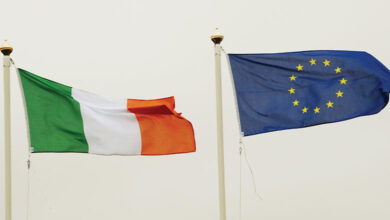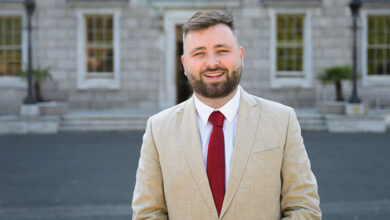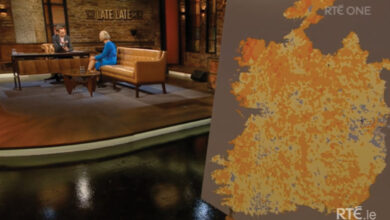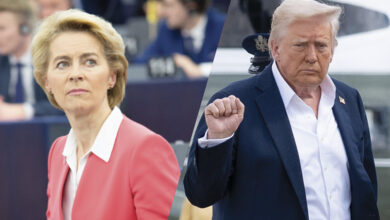Maria Walsh MEP: The Mercosur Trade Deal is a risk for Irish farmers and standards

As the EU looks towards ratifying the Mercosur trade deal, significant concerns are growing, particularly among the many Irish farmers I meet and work with on a daily basis, writes Fine Gael MEP Maria Walsh.
They are concerned about competing with imported products that are cheaper and produced at lower standards, threatening the livelihoods of farmers across Ireland and the EU.
During any discussion on this issue, it is important to note that the Mercosur deal offers benefits to certain sectors in the EU, including pharmaceuticals, processed food, geographical indications and machinery. It covers Argentina, Brazil, Paraguay, and Uruguay, has been 25 years in the making and was agreed in principle in 2019.
If ratified, it will reduce tariffs on over 90 per cent of EU exports to Mercosur countries, potentially boosting trade figures in areas like business services, life sciences, and beverages. However, for our beef farmers – the backbone of Irish agriculture – the deal in its current form presents more challenges than opportunities.
A fair playing field?
The prospect of tonnes of meat produced at lower costs and under poorer environmental and labour standards entering the European market is, understandably, a concern for Irish farmers. The agreement allows for an additional 99,000 tonnes of beef from Mercosur countries to enter the EU at a reduced tariff rate of 7.5 per cent, phased in over a period of six years. Of this, impact assessments estimate that 50,000 additional tonnes are likely to be imported. While this represents less than 1 per cent of total EU beef production, it carries significant weight for Irish farmers who are competing in an increasingly volatile global market.
Irish farmers produce beef of the highest quality which is renowned across global markets. After years of prioritising ethics and sustainability, we cannot change the goalposts and ask our farmers to compete with imports from countries where environmental protections are weaker, and production costs are significantly lower.
Environmental double standards
One of the most glaring issues within the Mercosur agreement is the difference in environmental standards between EU and South American farmers. With increasing pressure to reduce emissions and adopt sustainable practices to meet the targets set out in the EU Green Deal, Irish farmers are already navigating the complexities of climate action. These are necessary and welcome developments, the need for which are recognised by the majority of farmers, but they do come at a cost.
Given these costs, farmers have pointed to what they see as the hypocrisy of increasing imports given that as recently as 2022 saw record Amazonian deforestation. Despite efforts by the current Brazilian administration to curb this trend, farmers raise concerns that a return to previous political administrations could trigger rapid land clearance for cheap beef once again.
Some progress has been made within the Mercosur deal regarding environmental standards. The addition of a joint instrument in the agreement, which aims to enforce the Paris Agreement and tackle deforestation by 2030, is a positive step. However, questions remain about what the enforcement of these commitments look like in practice. How can we ensure that the Mercosur countries will meet their obligations, and what response will the EU take if they fail to do so?
I have had many exchanges with both the Trade and Agriculture Commissioners in the past few weeks and that is exactly what I insisted on: guarantees that there will be no unfair competition between our farmers and the South American ones in terms of environmental obligations.
Impact on Irish farmers
At the heart of this issue are the farm families who rely on beef production to make a living. The Mercosur deal has been at the forefront of my discussions with farmers across the Midlands-North–West constituency throughout 2024, and will remain there into 2025. They have very real concerns about the impact this deal will have on their ability to compete in an already tight global market. Many have expressed concerns that the flooding of the EU market with South American beef could drive down prices, making it even more difficult for them to secure a fair price for their produce.
The Commission has tried to assuage these concerns with the promise of a €1 billion Mercosur ‘safety net’ fund. However, regardless of the value of the fund, it provides little comfort to Irish farmers if they do not know how, or if, it will support their incomes. Crucially, the fund also cannot come out of the same envelope as CAP funding given the reliance of farmers on this for income security.
At the end of the day, I know that farmers do not want to rely on any type of ‘safety net’ fund. They want to work hard, produce high-quality products and receive a fair price in exchange. They do not want hand-outs, or pity. They want fairness, security and to be able to do their job with dignity.
A done deal?
I do not agree with those who say this is a done deal. While the European Commission has come to an agreement on Mercosur, the next two steps include approval from the Council, composed of leaders of the 27 member states, and approval from the European Parliament.
On a national level, the Programme for Government commits to working with ‘like-minded EU countries to stand up for Irish farmers and defend our interests in opposing the current Mercosur trade deal. What that means in practice is that we will not support it until we have sufficient commitments and assurances that our farmers are protected.
These next few months will be key to ensuring the needs of European farmers are reflected in the deal, and we are still working with the Commission on getting guarantees in our priority areas. Trade is important, but it must not come at the expense of our farmers, our rural communities, or our environment.
| Maria Walsh is a Fine Gael MEP in the Midlands-North–West European Parliament constituency. Walsh has been an MEP since 2019, and prior to this was a Defence Forces reserve and was the 2014 Rose of Tralee. Walsh holds an undergraduate degree in journalism from University College Dublin. |





